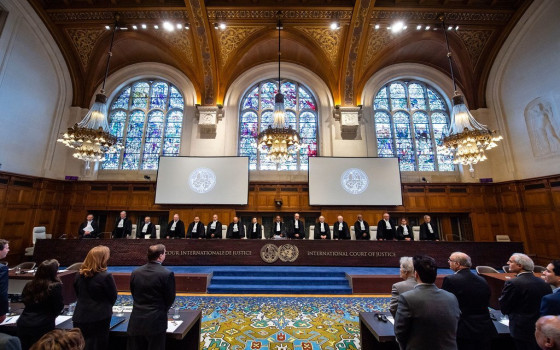
The International Court of Justice (ICJ) is considering the legally protected right of trade unions to strike.

- Europe and Arabs
- Wednesday , 8 October 2025 8:31 AM GMT
The Hague: Europe and the Arabs
Hearings at the International Court of Justice in The Hague, Netherlands, began last Monday and will continue for three days to determine whether the right to strike is protected under international law. This is the first time the court has been asked to weigh in on the balance between workers' rights and employers' interests.
This case stems from a request submitted by the Governing Body of the International Labour Organization in 2023, which requested an advisory opinion on whether the Freedom of Association and Protection of the Right to Organize Convention, 1948 (also known as Convention 87), includes the right to strike. According to the UN Daily Newsletter, "The Convention, adopted in the aftermath of World War II, is a cornerstone of international labor law, guaranteeing workers and employers the right to form and join organizations of their choosing. The Convention does not explicitly refer to strikes, but its advocates have long interpreted freedom of association to include this right.
The President of the International Court of Justice, Yuji Iwasawa, began the hearings on Monday by reading the formal question to the judges, referring to the ILO decision and the court's procedural authority. He referred to "the tripartite structure of the ILO, composed of representatives of governments, employers, and workers."
Rare Request
Tomi Kohiyama, ILO Legal Counsel, noted that the organization has not appeared before the ICJ for an advisory opinion since 1932, highlighting the rarity of such requests.
She added that the ILO Secretariat would not take a position on the matter, but would assist the court by clarifying the institutional context and interpretive approaches under the Vienna Convention on the Law of Treaties.
Referring to the tripartite nature of the ILO, Kohiyama said, "The participation of employers' and workers' organizations is unprecedented in the history of your esteemed institution."
Three Voices of the ILO
Founded in 1919, the ILO is unique within the United Nations system thanks to its tripartite structure, which brings together representatives of governments, employers, and workers to set international labor standards.
However, this balance has sometimes led to deadlock, notably in 2012, when employer groups challenged whether Conventions Nos. 87 and 98 (the Right to Organize and Collective Bargaining Convention) recognized the right to strike.
A Vital Tool
Baba Danquah, speaking for the International Trade Union Confederation, described strikes as a perennial expression of collective action. "The strike has always been our vital tool for improving working conditions and defending our human dignity," he told the court.
He argued that the right to strike is integral to the freedom of association and should therefore be recognized as a right protected under Convention No. 87.
In contrast, Roberto Suarez Santos, speaking for the International Organization of Employers, While the right to strike is not objectionable in principle, Convention No. 87 does not explicitly or implicitly cover the right to strike.
He warned that incorporating it into the Convention now would impose a mandatory regime—determining the forms of strikes—that could upset precise national labor regulations. He emphasized that the correct course is consensus within the ILO's tripartite bodies, not unilateral judicial raising of standards.
When will the advisory opinion be issued?
Over the three days of hearings, 21 states and organizations are expected to testify. Thirty-one written statements have already been filed with the court, reflecting the global interest in the outcome.
The court is expected to issue its advisory opinion in the coming months. While it will not be legally binding, it could profoundly impact international and national labor law.












No Comments Found